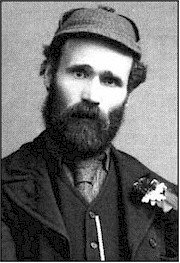A History Lesson

James Keir Hardie (1856-1915)
Born illegitimate to Mary Keir, who later married David Hardie.
At the age of 8 Hardie became a bakers delivery boy, earning next to nothing in order to help his family. At the age of 10 Hardie's younger brother was dying and after spending most of the night looking after him, he arrived late for work. His employer sacked him and also fined him a week's wages as a punishment for his unpunctuality. Unable to find work in Glasgow, the family moved back to Lanarkshire, and at the age of eleven, Hardie became a coal miner. (new IR reforms)
Hardie came to the conclusion that the working-class needed its own political party. With the support of Robert Smillie, the leader of the Lanarkshire miners, Hardie began advocating socialism and in 1888 stood as the Independent Labour candidate for the constituency of Mid-Lanark. Hardie first attempt to enter the House of Commons ended in failure as he finished at the bottom of the poll.
In the 1892 General Election Hardie stood as the Independent Labour candidate for the West Ham South constituency in London's industrial East End. Hardie won the election and became the country's first socialist M.P. The tradition at that time was for MPs to wear top hats and long black coats. Hardie created a sensation by entering Parliament wearing a cloth cap and tweed suit
In the House of Commons Hardie began advocating policies that had first been put forward by Tom Paine in his book Rights of Man in 1791. Hardie argued that people earning more than a £1,000 a year should pay a higher rate of income-tax. Hardie believed this extra revenue should be used to provide old age pensions and free schooling for the working class. Hardie also campaigned for the reform of Parliament. He was a supporter of the women's suffrage movement, the payment of MPs and the abolition of the House of Lords.
Hardie had for a long time believed that the various trade unions and the different socialist groups should join forces and form one large political party. Negotiations began in 1899 and the following year a meeting took place in London that resulted in the formation of the Labour Representation Committee. An organisation that eventually developed into the Labour Party.
The 1910 General Election saw 40 Labour MPs elected to the House of Commons. Hardie agreed to become leader again. Hardie's views were not always shared by other Labour MPs. Many disagreed with Hardie's support of women's suffrage. Although opposed to the use of violence, Hardie understood the reasons why some had adopted militant tactics and worked very closely with Sylvia Pankhurst and other socialists in the WSPU. In 1910 George Barnes replaced Hardie as leader of the Labour Party in the House of Commons.
Hardie also disagreed with many members of the Labour Party over the outbreak of war in 1914. Hardie was a pacifist and tried to organize a national strike against Britain's participation in the war. Despite being seriously ill, Hardie took part in several anti-war demonstrations and as a result some of his former supporters denounced him as a traitor. James Keir Hardie died on 25th September, 1915.
Where aretoday'ss James Keir Hardies' when we need them more that ever.

2 Comments:
hear hear dave. good to see you're more than a quizmeister.
mortgage quote
Post a Comment
<< Home